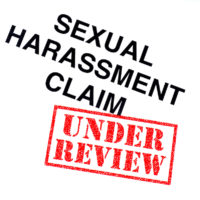Court Rules Employers Can Be Held Liable for Failure to Investigate a Sexual Harassment Claim

Having litigated sexual harassment cases for almost twenty years, our Alachua County, Florida sexual harassment attorneys have learned that employers often refuse to admit that an employee made an internal sexual harassment complaint. In refusing to acknowledge that an internal sexual harassment complaint was made, employers also admit that they never investigated the victim’s internal sexual harassment complaint. In admitting that they never investigated the victim’s internal sexual harassment complaint, employers place themselves in the position of having a court find that they failed to take prompt and effective remedial action after receiving notice of the sexually harassing behavior from the victim. Read on to learn more about the case about the failure to investigate a sexual harassment claim.
As explained by the U.S. Ninth Circuit Court of Appeals in Swenson v. Potter, 271 F.3d 1104 (9th Cir. 2001), “[n]otice of the sexually harassing behavior triggers an employer’s duty to take prompt corrective action that is reasonably calculated to end the harassment.” Generally, an employer’s notice of the sexually harassing behavior comes from a complaint by the victim. In Swenson, the Ninth Circuit further stressed the importance of an investigation in determining the adequacy of an employer’s response to a sexual harassment complaint and stated that the “most significant immediate measure an employer can take in response to a sexual harassment complaint is to launch a prompt investigation to determine whether the complaint is justified.” Thus, as determined by the U.S. Second Circuit Court of Appeals in Malik v. Carrier Corp., 202 F.3d 97 (2d Cir. 2000), “an employer’s investigation of a sexual harassment complaint is not a gratuitous or optional undertaking; under federal law, an employer’s failure to investigate may allow a jury to impose liability on the employer.”
The recent decision by the U.S. District Court for Arizona in Frotten v. INT Technologies, LLC, 2018 WL 2303032 (D. Ariz. May 21, 2018) is instructive in showing that an employer’s contention that the victim never made an internal sexual harassment complaint and related admission that it never investigated the victim’s internal sexual harassment complaint is a basis for holding the employer liable for the sexually harassing behavior.
Employee Claims Continuous Sexual Harassment
In that case, Robert Frotten (Frotten) brought a hostile work environment sexual harassment claim against his former employer, INT Technologies, Inc. (INT), pursuant to Title VII of the Civil Rights Act of 1964 (Title VII). Frotten worked as a technical recruiter at INT. INT is a staffing firm. Frotten’s position required him to recruit and place qualified candidates with INT’s clients for their information technology needs. Although he worked remotely, Frotten participated in weekly conference calls with INT management, sales managers, and recruiters.
Frotten claimed that throughout his employment he was subjected to unwanted sexually harassing conduct. According to Frotten, the weekly conference calls were replete with sexually explicit jokes and comments by INT supervisors. Frotten further claimed that a female supervisor described having sex with her husband, made sexual jokes, rubbed her breast against him, and sexually propositioned him. Frotten also alleged that he received an email from a female employee in which she described how a manager pretended to unzip his pants while saying he was going to teach her how to keep her job.
Frotten alleged that he complained to a manager in December 2015 about the sexual harassment. Despite his complaint, Frotten claimed that the sexually harassing behavior continued. In fact, Frotten alleged that the female supervisor rubbed her breast against him and sexually propositioned him after he complained about sexual harassment. INT denied that Frotten complained about sexual harassment in December 2015. According to INT, Frotten did not complain about sexual harassment until he filed a charge of discrimination with the U.S. Equal Employment Opportunity (EEOC) commission in March 2016. After receiving notice of Frotten’s allegations of sexual harassment in the EEOC charge of discrimination that same month, INT claimed that it launched a prompt investigation. Ultimately, Frotten resigned his employment with INT on April 19, 2016 because of the alleged sexual harassment and retaliation he experienced at INT.
Investigation Is A Key Step In Remedial Process
INT filed a motion with the trial court seeking dismissal of Frotten’s sexual harassment claim. In doing so, INT asked the trial court to find that Frotten’s sexual harassment claim was meritless and Frotten was prohibited from bringing his sexual harassment claim before a jury. The trial court denied INT’s motion for dismissal and ruled that Frotten’s sexual harassment claim must be decided by a jury.
In moving for dismissal, INT argued that it was not liable for any sexually harassing behavior Frotten allegedly experienced because it took prompt and effective remedial action after receiving notice of the harassment in March 2016 by launching a prompt investigation. However, the trial court pointed out, Frotten alleged that he initially complained about sexual harassment in December 2015. It was undisputed, the trial court observed, that INT did not investigate Frotten’s sexual harassment complaint in December 2015. “An investigation,” the trial court explained, “is a key step in the employer’s remedial obligation to end the current harassment.” Thus, the trial court concluded that it was for the jury to decide whether INT “took reasonable steps to promptly resolve [Frotten’s] sexual harassment complaint.”
Free Consultation With Alachua County Harassment Lawyers
Our employment law attorneys have substantial experience representing employees who have been subjected to sexual harassment in the workplace. If you have been the victim of sexual harassment or have questions about an employer’s investigation of a sexual harassment complaint, please contact our office for a free consultation with our Alachua County, Florida harassment attorneys. Our employee rights law firm takes sexual harassment cases on a contingency fee basis. This means that there are no attorney’s fees incurred unless there is a recovery and our attorney’s fees come solely from the monetary award that you recover.


 Close Menu
Close Menu